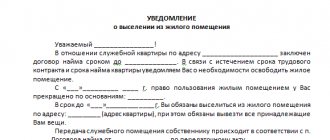Prices for lawyer services on housing issues
Eviction from non-residential premises is possible under the circumstances specified in the lease agreement.
Non-residential premises may be provided for temporary use to citizens and legal entities, which is formalized by concluding lease agreements or indefinite use. Based on the legal essence of the lease agreement, circumstances may be established in which forced eviction from the premises is possible.
Civil legislation provides for the following situations when the owner has the right to demand the vacancy of non-residential premises:
- Expiration of the agreement.
- Refusal of the tenant to voluntarily vacate the real estate object provided for indefinite use.
- Availability of a court decision on the forced eviction of a user from a non-residential property.
- Transfer of ownership of a real estate property, in which there is no legal succession of the parties.
Grounds for eviction from non-residential premises
Since the specified grounds for the forced vacation of a rented property are provided for by law, the owner must strictly follow the eviction procedure.
The presence of grounds is initially determined by the owner of the building. It is on the specifics of such grounds that the further procedure for eviction actions depends, when prior notification of vacating non-residential real estate is required.
After the dispute is referred to the court for consideration, the circumstances of the eviction are subject to establishment and proof during the trial. Each party has the obligation to prove the facts to which it refers.
Homeowner's responsibility
If the property owner acts strictly according to the law, then he does not face any sanctions from the state. If the eviction order is violated, the landlord faces liability depending on the actions taken.
- Use of force or threat of its use. Criminal liability for causing harm to health or threats of physical harm.
- Damage to tenants' property. Criminal liability (hooliganism), civil liability in the form of compensation for damage caused.
- Replacing locks in the apartment. Criminal liability (charge of theft).
Sources
- https://uristdnya.com/pravo/zhilishnoe/vyselenie/vyselenie-iz-nezhilogo-pomeshheniya.html
- https://ProVyselenie.ru/vyselenie-iz-nezhilogo-pomeshheniya/
- https://law-divorce.ru/kak-vygnat-arendatora-iz-nezhilogo-pomeshheniya/
- https://allo-urist.com/kak-vygnat-arendatora-iz-nezhilogo-pomeshheniya/
- https://ipoteka-nedvizhimost.ru/vyselenie-iz-nezhilogo-pomeshheniya/
- https://advocate-service.ru/vyselenie/iz-nezhilogo-pomeshheniya.html
- https://Pravda-Zakona.ru/article/kak-vyselit-zhiltsov-iz-kvartiry.html
[collapse]
Procedure for eviction from non-residential premises
Eviction from non-residential premises upon expiration of the contract does not require additional notification to the user, although in practice the owner notifies in advance that there is no intention to renew the agreement. In this case, the tenant has the opportunity to prepare in advance to vacate the premises, and if he refuses to do this, he should file a claim in court.
If the agreement is concluded without specifying a period, the owner is obliged to send written notice of the termination of such agreement within a reasonable time.
In practice, such notice is sent one month before the expected date of termination of the contract. If the user does not vacate the premises within the specified period, the owner receives grounds to apply to the court for forced eviction.
In situations where the tenant violates the essential terms of the contract, early termination of the contract may follow. The legislation includes the following situations when the agreement can be terminated early at the request of the owner:
- Systematic violation of payment terms for the use of non-residential buildings.
- Significant deterioration in the condition of real estate, which may lead to its damage or destruction.
- Violation of other terms of the contract, recognized by the parties as grounds for early termination of contractual relations.
All of these grounds oblige the owner to send a written notice to the user about the inadmissibility of violations of the terms of the contract and legal requirements. In case of failure to comply with the legal requirements of the owner of the structure, he may file a claim for early termination of the contractual relationship and forced eviction of the user.
As a rule, the transfer of rights to a new entity does not entail the termination of contractual relations with the user.
However, in a number of cases, the transfer of such a right is accompanied not only by the termination of the contract, but also by the eviction of the tenant. For example, such situations arise in the case of transfer of rights to non-residential real estate to the state or local governments.
Forced eviction in such cases is preceded by the presentation of a written notice of the need to vacate the occupied property. If the user refuses to comply with this requirement, eviction will be carried out in court.
Moving into an apartment through the court
It is not always possible to easily move into an apartment if you have the right to use it. Sometimes you have to go through the courts. Contacting authorities may be required in the following cases:
- A citizen living in an apartment on the basis of a social tenancy agreement gets married. Neighbors in the living space are against the tenant's spouse moving in. In this case, he will have to act officially.
- Citizens have entered into a lease agreement, but the owner does not hand over the keys. The tenant will have to defend his right in court.
- A claim for occupancy may be counterclaimed if the citizen was deprived of the right to use the premises without reason.
- Coercive methods are used when there are several owners, but the relations between them are unfavorable. An owner whose right to use living space is infringed can defend it.
When it is necessary to move into an apartment owned by the municipality, a representative of the local administration may participate in the legal process. If the decision is positive, the social tenancy agreement will need to be reissued.
After the court decision enters into legal force, you can move into the apartment. However, people living there can prevent this, despite the position of the authorities. In this case, you will need to contact the FSSP for help. Bailiffs will give violators the opportunity to comply with the decision voluntarily, and if nothing changes, they will do it forcibly. To do this, the locks will be opened in the presence of police officers. Every action is documented.
The next step is to register for the apartment at your place of residence. To do this, you need to contact the territorial authorized body or MFC.
Arbitrage practice
In cases where the owner exercises the right to evict from non-residential premises, judicial practice, in general, stands for the protection of the rights of the parties to the agreement. Termination of civil legal relations is permitted only under the conditions provided for by law.
A significant number of disputes regarding eviction from such properties concern the determination of the following characteristics of the premises:
- Classifying them as non-residential real estate (establishing technical parameters characteristic only for non-residential premises).
- The main intended purpose of such buildings and structures (the inability to use them for permanent residence of individuals; the purpose of use is production, trade and other types of activities).
Judicial practice pays special attention to the conditions for determining a significant violation of the provisions, which may lead to its early termination and forced eviction of the user. In addition to the grounds expressly provided for by law, the court analyzes the specific terms of the agreement between the landlord and the tenant, and also considers the evidence presented by the parties.
The significant nature of the violation of relations between the parties implies for the owner of a non-residential building (structure) the infliction of damage, as a result of which he largely loses what he had the right to count on when concluding the agreement.
In practice, the largest share of such cases are disputes over late payment of rent payments. A single case of non-compliance with the conditions regarding the procedure for payment for use cannot be significant. Only in the event of a systematic (constant) violation of payment terms will the court recognize this violation as significant and may decide to forcibly vacate the premises occupied by the tenant.
Author of the article
Dmitry Leonov
Work experience 15 years, specialization - housing, family, inheritance, land, criminal cases.
Author's rating
721
Articles written
712
about the author
Useful information on housing issues
- Eviction of a non-owner
- Eviction from non-residential premises
- Eviction from service housing
- Illegal eviction from housing
- Forced eviction
- Eviction from a mortgaged apartment
- Eviction of ex-spouse
- Eviction of debtors from an apartment for non-payment
- Eviction from public housing
- Claim for eviction from an apartment
- Eviction from the hostel
- Eviction from residential premises
- Eviction of a minor child from an apartment
- Eviction without provision of other accommodation
Grounds for terminating a lease agreement
Reasons for terminating a rental agreement may vary. Depending on this, the owner may require the premises to be vacated with or without notice. Options for mandatory notification are considered:
- Completion of the transaction period.
- The owner terminates the transaction unilaterally. This is possible only if the terms of the contract allow it.
- The lease agreement was declared invalid. In this case, the owner returns the rent and the tenant vacates the premises.
- The object is removed from property for government purposes.
- Change of owner of the premises.
- Transferring a non-residential property to residential status.
We described in detail what the grounds are for terminating a lease agreement for non-residential premises and what the procedure is in a separate article.
If the tenant does not comply with the terms of the agreement, the property owner has the right to demand the vacancy of the premises without notice (Article 619 of the Civil Code of the Russian Federation):
- The tenant is late paying the rent.
- Utilities are not paid.
- Keeping the premises in poor condition or deliberately damaging it.
- The facility is not being used for the intended purpose specified in the agreement.
- The tenant subleases the territory without the consent of the owner.
In any case, you should first try to resolve the problem by mutual agreement before moving on to legal proceedings.
Is it possible to evict unscrupulous tenants in winter?
The question of whether it is possible to evict tenants in winter is often asked by landlords - owners of residential premises. Meanwhile, the time of year does not matter. Therefore, it is possible to kick out an indebted tenant in the winter on a general basis.
Another thing is that special clauses may be specified in the lease agreement. Then the eviction process becomes more complicated.
Some people are also interested in whether it is possible to evict tenants during the heating season? In some regions of Russia it starts in the fall and is pumped in the spring. There are no additional features here either. But, along with the rent debt, the tenant will have to additionally recover compensation for expenses for heat and other utility bills.
Can an apartment owner kick out tenants in winter if there is no contract? In this situation, the entire procedure is described above, and there are no amendments to calendar dates. It is only important to adhere to all legal norms in the event of a conflict with an unscrupulous tenant.
How to evict a tenant if there is no agreement
It often happens that people are allowed to live in an apartment without formalizing all relationships in writing. However, eviction of tenants without a contract is also possible.
In this situation, you need to act using traditional legal methods. How to competently evict tenants from an apartment without a contract?
The owner of the apartment has the right to completely calmly change the locks on the doors without warning anyone about it. You can invite representatives of the management company and the district police officer for this procedure, providing documents confirming ownership of the residential premises.
In the event that arrogant tenants take a defensive stand, it is also necessary to go to court with a claim for eviction. Unfortunately, the procedure is long, but there are no other options.
If there was no rental agreement for the apartment, then collecting the rent arrears will be very difficult, but possible. To do this, you need to order a certificate from the Chamber of Commerce and Industry about the average market cost of renting an apartment in your case.
It is, of course, possible to kick out insolent tenants using radical measures, throwing all their property onto the landing or into the yard, but this is already a scandal with all the ensuing consequences.
Some desperate homeowners write a statement to the police that unauthorized persons have entered the apartment. This method of getting rid of unscrupulous tenants also takes place.
Is it allowed to evict a tenant with children?
There is also a standard procedure here, except in cases where the tenant and the child have registered in a rented apartment (which is not prohibited by law).
When concluding an agreement, stipulate in advance the conditions for the tenant’s child and other persons to live in the apartment, as well as the possibility of temporary registration.
In this case, it is advisable to consult a lawyer in St. Petersburg in order to avoid further complications. Legal advice can be provided in the office by appointment by calling the phone number listed on the website.
Step-by-step instructions on how to do this
Without trial
First, you need to try to resolve the dispute out of court. To do this, the landlord sends the tenants a pre-trial claim or notice. It is delivered in person, and then the employer must sign, or sent by mail - regular or registered mail. If the tenants have ignored the legal demands of the owner, they can go to court.
With filing a claim
The claim should be filed in the district court at the location of the apartment. The form and content of the application are established by Article 131 of the Civil Procedure Code of the Russian Federation. The claim must indicate :
- Name of the court.
- Full name of the plaintiff and his place of residence.
- Name and address of the defendant.
- The essence and basis of the requirements.
- Information on compliance with the pre-trial procedure for contacting the defendant.
- Calculation of the tenant's debt (if the reason for eviction is non-payment of rent).
The following documents must also be attached to the claim::
- A copy of the lease agreement and the apartment acceptance certificate.
- A copy of the pre-trial claim.
- Documents confirming claims against the defendant. These could be, for example, copies of neighbors’ statements to the police if the reason for the eviction is a violation of their rights and interests.
- Copies of the claim by number of defendants and third parties.
- Receipt for payment of state duty.
After filing a claim, the owner will have to be patient. The period for consideration of such a case is up to two months. Once the verdict is passed, both parties are given another 30 days to file an appeal if either party to the dispute disagrees with the decision.
In addition, the court may give the tenant time to eliminate violations - up to one year . In this case, if the tenants still do not comply, the tenant will have to re-file the eviction case.








